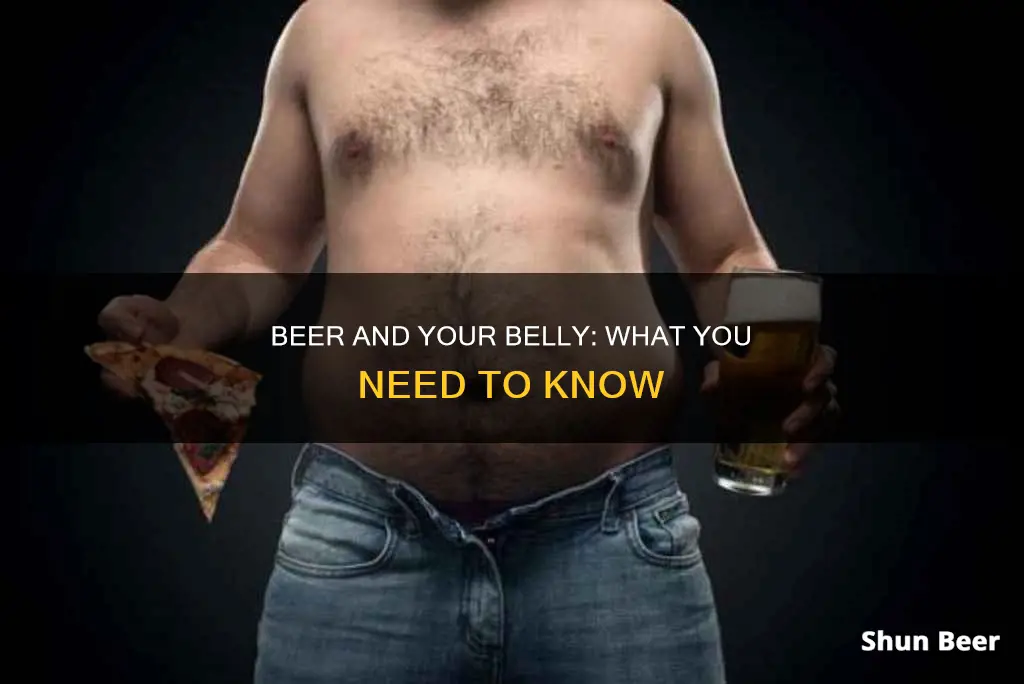
Drinking beer has several effects on the stomach and the digestive system. Beer contains ethanol, which in certain concentrations can stimulate digestion in the stomach, a process known as gastric emptying. Beer also contains alcohol, which is an irritant for stomach problems. Alcohol increases the amount of acid in the stomach, which can irritate the stomach lining and trigger symptoms such as abdominal cramps, heartburn, nausea, and vomiting. Beer is also associated with weight gain, as it contains more than 150 calories per can, and it stimulates your appetite, which can lead to increased calorie intake.
What You'll Learn

Beer and stomach irritation
Beer is a popular alcoholic drink, but it's important to understand its effects on the body, especially the stomach, to ensure it is consumed safely. Beer contains alcohol, which is known to irritate the gut, including the stomach. This irritation can lead to various issues, and it is essential to recognise the signs and take appropriate action.
Beer, like other alcoholic beverages, can irritate the stomach lining and trigger stomach problems. Alcohol increases the acid levels in the stomach, which can cause heartburn, nausea, vomiting, and loss of appetite. In addition, alcohol can make the stomach produce more acid than usual, leading to inflammation and pain (gastritis). Over time, this can result in the development of painful stomach ulcers.
Risk Factors
Excessive alcohol consumption is a significant risk factor for stomach irritation and pain. However, even in individuals without pre-existing stomach issues, alcohol can trigger pain. Other factors that contribute to stomach irritation include stress, smoking, and consuming certain types of food, such as spicy, acidic, or fried foods.
Preventing and Managing Stomach Irritation
To prevent and manage stomach irritation caused by beer or other alcoholic drinks, it is crucial to control and limit alcohol consumption. Here are some specific recommendations:
- Sip green tea or mint tea throughout the day to support stomach health.
- Stay hydrated by drinking plenty of water, especially when consuming alcohol, as it is a diuretic and can lead to dehydration.
- Eat a meal, especially one rich in carbohydrates, before drinking to slow down alcohol absorption and limit its quantity.
- Consume fatty foods, as fat slows down the rate at which food leaves the stomach, reducing the speed of alcohol absorption into the bloodstream.
- Take an antacid before drinking if you know alcohol upsets your stomach.
- Avoid mixed drinks, as they can make it challenging to track alcohol consumption, leading to accidental overconsumption.
- Be mindful of your drinking time. Enzymes that metabolise alcohol are typically at their lowest at lunchtime, making an alcoholic drink at this time more potent.
Beer and Weight Gain
While beer may not specifically contribute to weight gain around the abdomen, it plays a role in overall weight gain. A typical beer contains over 150 calories, and consuming several in one sitting can result in a significant calorie overload. Additionally, alcohol stimulates appetite, leading to increased food consumption, and it interferes with fat-burning processes in the body.
Beer and Abs: Is It Possible to Have Both?
You may want to see also

Beer and weight gain
Drinking beer is often associated with weight gain and the development of a "beer belly". However, it is important to note that while beer and alcohol consumption can contribute to weight gain, they are not the sole causes. Several factors, including diet, genetics, age, and lifestyle choices, also play a role in the accumulation of abdominal fat.
Caloric Intake and Appetite Stimulation
Beer and alcohol, in general, contain a significant number of calories. A typical beer has around 150 calories, and consuming several in one sitting can result in a calorie overload. Additionally, alcohol stimulates your appetite, leading you to eat more than you usually would. The combination of increased caloric intake from beer and the stimulation of appetite by alcohol contributes to weight gain.
Interference with Fat Burning
When you consume alcohol, your liver prioritises burning off the alcohol instead of burning fat. This interference with fat burning can lead to an accumulation of fat in the body, particularly in the abdominal region. As a result, individuals may develop a "beer belly", characterised by excess abdominal fat.
Genetic and Hormonal Factors
Genetics and hormones also influence where your body stores fat. Generally, women tend to store fat in their arms, thighs, and buttocks, as well as their bellies, while men tend to store more fat in their bellies alone. As people age, their hormone levels decrease, making them more likely to store fat in their midsections, regardless of gender.
Health Risks of Excess Abdominal Fat
Having a "beer belly" or excess abdominal fat is linked to increased health risks, including erectile dysfunction, fatty liver disease, high blood pressure, and polycystic ovary syndrome. Visceral fat, which is located deep within the abdominal cavity and surrounds the organs, is particularly concerning. It is associated with an increased risk of heart disease, metabolic syndrome, and overall mortality.
Strategies to Reduce Belly Fat
To reduce belly fat, it is recommended to switch to lower-calorie beers, non-alcoholic beers, or mocktails. Combining strength and cardio fitness programs can also aid in weight loss and reducing belly fat. Additionally, scaling back on alcohol consumption or quitting entirely can be beneficial. It is important to note that there is no quick fix, and losing weight requires a consistent commitment to a balanced diet, appropriate portions, and regular physical activity.
Beer and Aligners: What You Need to Know
You may want to see also

Beer and appetite stimulation
Beer and other alcoholic drinks have been shown to increase appetite and energy intake. In a study by Hetherington et al. (2001), 26 male participants were given a standard breakfast and then either rested, were given a no-alcohol lager, or the same lager with alcohol. The participants who had consumed alcohol had a 30% higher total energy intake, including the energy from the alcohol, suggesting that energy from alcohol is not compensated for in the short term and may even stimulate food intake. This is supported by a review by Caroline Gee (2006), which found that out of eight studies, three showed a significant difference in energy intake following a high-dose alcohol preload compared to a no-alcohol preload. However, the review also concluded that the effect of alcohol on appetite appears unsubstantiated and that further research is needed.
Several factors may contribute to the association between alcohol and increased appetite. Firstly, alcohol provides additional calories, and when consumed in excess, can lead to a calorie overload. Beer, for example, typically contains 150 calories per serving. Secondly, alcohol interferes with the body's ability to burn fat. When you drink alcohol, the liver prioritises burning alcohol instead of fat, which can contribute to fat accumulation in the belly. Thirdly, alcohol can lower inhibitions, making it easier to give in to food cravings or make less healthy food choices. This is especially true when drinking in social settings, where the available food options are often high in fat and calories, such as pizza, wings, and fried foods.
In addition to its impact on appetite and energy intake, alcohol can have various effects on the stomach and digestive system. Alcohol is associated with acid reflux, heartburn, and gastritis, which is the inflammation of the stomach lining. Chronic gastritis can increase the risk of developing stomach ulcers, polyps, or tumours. Alcohol can also make the stomach produce more acid than usual, which can wear away at the stomach lining, causing pain and inflammation. Furthermore, heavy regular drinking can impair the body's ability to digest food and absorb nutrients, leading to potential nutrient deficiencies.
While beer and other alcoholic drinks may stimulate appetite and increase energy intake, it is important to note that excessive alcohol consumption can have negative consequences for overall health. To minimise these risks, it is recommended to follow low-risk drinking guidelines, such as those provided by the UK Chief Medical Officers, which advise consuming no more than 14 units of alcohol per week, avoiding binge drinking, and having several drink-free days.
Beer and Pot: Mixing, Matching, and Safety Tips
You may want to see also

Beer and acid reflux
Drinking beer can have a range of effects on the stomach. Beer contains alcohol, which is known to irritate the gut and stomach lining. This irritation can lead to acid reflux, where acid rises from the stomach into the throat, causing heartburn.
Alcohol can increase the amount of acid in the stomach, which may wear away at the stomach lining, causing inflammation and pain (a condition known as gastritis). Over time, this can lead to the development of painful stomach ulcers. Alcohol can also relax the lower oesophageal sphincter, allowing acid to flow back up from the stomach, resulting in acid reflux and heartburn.
In addition to its effects on acid reflux, beer and alcohol consumption are associated with weight gain, particularly around the abdomen, contributing to the infamous "beer belly". This is due to the high calorie content of beer and the way alcohol interferes with the body's ability to burn fat. Alcohol stimulates the appetite, leading to increased food consumption, and it impairs judgment, resulting in less healthy food choices.
However, it is important to note that the relationship between beer and acid reflux is complex. Some studies suggest that ethanol, in certain concentrations, can stimulate digestion in the stomach (gastric emptying). Beer and low ABV white wine were found to accelerate gastric emptying compared to ethanol alone. On the other hand, beverages with higher ethanol content, such as whisky and gin, do not appear to stimulate gastric acid secretion or the release of gastrin. Therefore, while beer may contribute to acid reflux in some individuals, its effects on digestion and acid secretion are not fully understood.
Beer Drinking: Slow and Steady or Fast Finish?
You may want to see also

Beer and stomach ulcers
Drinking alcohol can irritate the gut, including the stomach. Alcohol is associated with acid reflux, or heartburn, and can cause the stomach to produce more acid than usual, which can wear away the stomach lining, causing inflammation and pain (gastritis). Over time, this can lead to the development of painful stomach ulcers.
Stomach ulcers, or gastric ulcers, are sores that develop on the inner lining of the stomach. They are a type of peptic ulcer, which can also occur in the duodenum (the upper part of the small intestine), or the oesophagus (the tube that carries food from the throat to the stomach).
The most common symptom of a stomach ulcer is abdominal pain, which can occur anywhere from the navel up to the breastbone. This pain can feel worse when the stomach is empty, and better after eating or taking an antacid. Other symptoms include vomiting blood, bloody or black stools, unexplained weight loss, changes in appetite, difficulty breathing, and feeling faint or weak.
Stomach ulcers are most commonly caused by bacterial infections, certain medications, or rare tumours. While stress and spicy foods were once thought to be the main causes of peptic ulcers, they are now only considered to be aggravating factors. Alcohol consumption is not considered a direct cause of peptic ulcers, but it can increase the likelihood of symptoms being present. Alcohol-related gastritis can also exacerbate ulcer symptoms and increase the chances of developing ulcers.
Brita Water Filter: The Ultimate Beer Upgrade?
You may want to see also
Frequently asked questions
A beer belly is a protrusion of fat in the belly that is caused by consuming too many calories. While it is called a "beer belly", it is not necessarily caused by beer alone. It is caused by consuming too many calories, whether from alcohol, sugary beverages, or food.
Yes, drinking beer can cause weight gain. A typical beer has 150 calories, and drinking several in one sitting can lead to a calorie overload. Beer also stimulates your appetite, which can lead to eating more.
Yes, drinking beer can affect digestion. Ethanol, in certain concentrations, can stimulate "gastric emptying", which refers to digestion in the stomach. Beer and low ABV white wine have been found to accelerate gastric emptying compared to ethanol of the same concentration.
Drinking beer can irritate the stomach and digestive system. Beer can increase the amount of acid in the stomach, which can irritate the stomach lining and trigger symptoms such as abdominal cramps, heartburn, nausea, and vomiting. Prolonged consumption can lead to reduced absorption of nutrients, malnutrition, and stomach complications such as gastric ulcers and bleeding.
To avoid stomach pain when drinking beer, it is recommended to drink green tea or mint tea during the day, as well as water, to prepare the body for alcohol consumption. Eating a carbohydrate-rich meal before drinking can also help slow down the absorption of alcohol.







